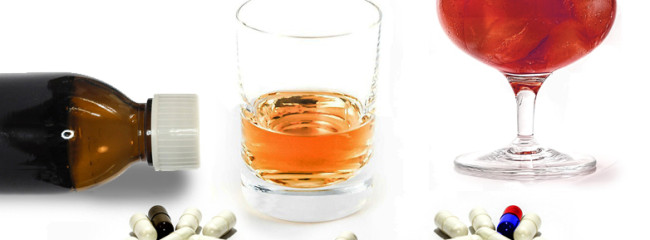Can over-the-counter medicines get you arrested for DWI?
In a word, yes. I recently defended a driver whose BAC (blood alcohol content) should not have been as high as the breath test revealed. She hadn’t had enough drinks to account for the reading. It turned out she had ingested alcohol from an over the counter medication without realizing it. She hadn’t given any real thought to the possibility the ingredients in her medication would increase her BAC and put her over the limit.
Vehicle & Traffic Law (VTL) § 1192(2) makes it illegal to drive with .08 BAC or more (DWI—a class A misdemeanor). Statutes and case law also make it illegal to drive with .05 to .079 (DWAI….VTL 1192[1]….a violation). Sometimes, just a little alcohol can make all the difference in a BAC reading and put you on the wrong side of the numbers.
The law provides no exception for where the alcohol comes from. Beer, wine, Romulan ale or cough syrup….a BAC higher than the limit can get you arrested. Alcohol’s debilitating influence does not vary with its source.
One of the tools police use in determining whether or not to make an arrest is an alco-sensor. It is a hand held breath device used during the traffic stop. It is not reliable for determining how much alcohol is in your system, but it is reliable for detecting the presence of alcohol. I witnessed a demonstration of this device with a person who had not drank any alcoholic beverage but had gargled with a popular mouthwash 5 minutes before the also-sensor test. His BAC was .50….ten times the legal limit! The membranes in his mouth had retained so much of the alcohol that it registered an exceptionally high amount of alcohol (most people would be dead of alcohol poisoning at .50 BAC). His actual BAC was not .50. It was closer to .00 as he had not drank any liquid with alcohol. But his also-sensor reading would have supported the finding of probable cause needed for his arrest.
The content of popular mouthwashes varies. Some are as low as 7% and some are as high as 70%. There are plenty of mouthwashes in the natural food sections of the market and at health food stores which do not use any alcohol. I recommend them as an alternative which leaves no room for false readings or misunderstandings.
Mouthwashes usually don’t change your actual BAC as measured by the breath test at the station which measures the alcohol in deep lung air (a much more reliable device than the also-sensor) Medicines containing alcohol which are ingested do increase BAC.
Some cough drops contain 22% alcohol. Alcohol makes up 10, 20 and even 25% of some cough medicines. It is like taking a shot of bourbon. Some laxatives, iron supplements, and medications for pain, toothaches, allergies, and even vitamins contain significant and possibly game changing amounts of alcohol.
There is a good list of medications and their alcohol content here:
http://www2.potsdam.edu/alcohol/HealthIssues/1127525665.html#.VKMvAcZtl4U
For a list of alcohol free medications, visit this site:
http://www.bot.ca.gov/licensees/alcoholfree_guide.pdf
(This list is a few years old, so always check the current labels)
Remember, no matter the source of the alcohol, the limit is the limit. And alcohol will impact upon your ability to drive regardless of what source it comes from.


夢巴黎春藥網:https://pariss88.com/
女性催情春藥:https://pariss88.com/product-category/aphrodisiac/
女性迷幻春藥:https://pariss88.com/product-category/psychedelic/
印度正品代購:https://pariss88.com/product-category/medicine/
男性壯陽補腎:https://pariss88.com/product-category/kidney/
陰莖增大增粗:https://pariss88.com/product-category/thicken/
GB系列春藥:https://pariss88.com/product-category/aroused/
所有春藥商品:https://pariss88.com/shop/
春藥資訊:https://pariss88.com/blog/
關於我們:https://pariss88.com/about-us
Reply春藥對女性性慾望的顯著增強作用!
春藥是最受歡迎的女性催情藥物,讓愛火重燃的秘密武器!
春藥是什麼?揭開女性催情藥的神秘面紗
春藥如何影響女性性反應?揭開春藥的實際效果
春藥會讓人上癮嗎?揭開女性催情藥的真實效果與安全性
春藥效果解析:提升女性性慾與性愛滿意度的秘密武器
春藥對女性身體的深層影響:從血液循環到極致快感的全面解析
春藥的效果與作用:提升女性性慾望與性滿意度
春藥效果與作用全面解析:激發女性性慾與改善性冷淡
春藥是激發女性性慾望及提升性高潮快感的秘密武器
春藥的催情效果全解析:讓性愛更激情性高潮更猛烈
春藥效果大揭密:找回激情性愛的秘密武器!
女性服用春藥後的真實反應:從羞澀到淫蕩發騷的轉變
春藥如何幫助女性體驗激情性愛:全面指南
春藥:點燃女性激情,體驗極致性愛享受的秘訣
春藥如何通過刺激女性荷爾蒙來增強性快感?
春藥如何幫助女性找回激情性愛,享受極致快感?
春藥如何激發女性淫蕩慾望,讓女性主動求愛的?
春藥在兩性關係中起到哪些作用?解析春藥的效果
春藥在性愛中的關鍵作用:釋放女性淫蕩慾望
春藥如何讓女性淫蕩發情主動求歡:全面解析春藥效果
春藥如何幫助女性重燃性愛激情體驗美妙性高潮?
春藥的神奇效果:從淑女到淫蕩發騷的轉變
春藥的催情效果:讓女性在性愛中欲仙欲死的極致體驗
春藥的效果:激發女性性慾望的深度解析
春藥番外篇:天然春藥與合成春藥的效果對比
Reply春藥
媚藥
催情春藥
催情藥
女性春藥
春藥哪裡買
春藥推薦
春藥是什麼
春藥水
有效春藥
正品春藥
無色無味的春藥
網購春藥
進口春藥
女性媚藥
日本媚藥
日本春藥
春藥真的有用嗎
春藥有副作用嗎
催淫春藥
春藥膠囊
粉狀春藥
液體春藥
昏睡春藥
迷情春藥
迷幻春藥
催眠春藥
口交水
聽話水
乖乖水
失憶水
催情水
迷姦水
迷姦藥
迷幻藥
高潮液
催情液
春藥粉
女性發騷水
淫蕩發騷春藥
女性催淫春藥
激發女性性慾
增強性快感
增加女性主動
增加女性分泌物
增加女性敏感度
治療女性性冷淡
誘發女性性渴望
事後無記憶
迷幻催情春藥
昏睡失憶春藥
強效催情春藥
女性淫蕩發騷
女性催情膠囊
無副作用春藥
女性潮吹春藥
男女通用型春藥
催情口服液
無色無味的春藥
催情春藥水
女性催情媚藥
昏睡迷姦春藥
無色無味春藥水
超強淫蕩媚藥
女性外用春藥
刺激陰蒂快感
女性催情高潮液
女性私處高潮液
女性高潮潤滑劑
女用催淫凝膠
強效催情凝膠
發騷春藥凝膠
Reply一滴銷魂催情水:https://pariss88.com/product/tghy/
宮廷玉液催情水:https://pariss88.com/product/wdrg/
日本淑女剋星精華素:https://pariss88.com/product/ghyu/
狂愛催情水:https://pariss88.com/product/kacq/
火狐春藥粉:https://pariss88.com/product/refo/
美國卡宴春藥水:https://pariss88.com/product/rgyh/
LOVE女用催情液:https://pariss88.com/product/logd/
回春之夜:https://pariss88.com/product/hczy/
love seed催情液:https://pariss88.com/product/seyp/
Sexy性の渴慾望液:https://pariss88.com/product/sexy/
日本萌花魁:https://pariss88.com/product/mhky/
澀女郎發情水:https://pariss88.com/product/snlf/
日本Drop Girl媚藥:https://pariss88.com/product/rbdr/
紅影淫狼Wild Wolf:https://pariss88.com/product/wred/
超級金蒼蠅淫蕩水:https://pariss88.com/product/xbyk/
金蒼蠅迷情液:https://pariss88.com/product/mqyr/
印度Lovegra果凍威而鋼:https://pariss88.com/product/sgby/
蒼蠅迷魂粉:https://pariss88.com/product/cyfg/
日本性奮劑:https://pariss88.com/product/mhgy/
極上潮吹濃縮膠囊:https://pariss88.com/product/jsjn/
印度女神之戀Kiss gold:https://pariss88.com/product/nszl/
AOE愛巢發騷水:https://pariss88.com/product/aoey/
春情蕩漾迷情液:https://pariss88.com/product/cqdy/
美國強迫失身水:https://pariss88.com/product/mrgy/
金蒼蠅催情水:https://pariss88.com/product/jcys/
美國卡宴春藥粉:https://pariss88.com/product/kycq/
印度威而柔femafill-100:https://pariss88.com/product/rghm/
法國仕女亂情水:https://pariss88.com/product/fyur/
美國D水:https://pariss88.com/product/usar/
紅蜘蛛催情水:https://pariss88.com/product/hzse/
丹麥黑潮口交水:https://pariss88.com/product/dmhc/
KISS女用催情水:https://pariss88.com/product/kshj/
日本愛欲:https://pariss88.com/product/rbay/
LOVE SHOT春藥水:https://pariss88.com/product/lscy/
日本紅色H春藥水:https://pariss88.com/product/rbhs/
LOVE JUICE頂級春藥:https://pariss88.com/product/juice/
日本淫汁:https://pariss88.com/product/wedr/
日本超強淫汁:https://pariss88.com/product/rbdj/
黑寡婦性激素:https://pariss88.com/product/ygks/
Banana口交催情藥:https://pariss88.com/product/banr/
X-Ony性愛催化劑:https://pariss88.com/product/xony/
日本奇淫合歡水:https://pariss88.com/product/qyhs/
紫色綺夢口交水:https://pariss88.com/product/zsly/
西班牙金蒼蠅迷情液:https://pariss88.com/product/mqys/
Reply天使の淚:https://pariss88.com/product/tszl/
KKK3迷姦粉:https://pariss88.com/product/kytr/
SAOB強效昏睡液:https://pariss88.com/product/sabb/
嘜可奈因:https://pariss88.com/product/mkny/
Raging催情失憶水:https://pariss88.com/product/raging/
香港彼迪三唑侖片:https://pariss88.com/product/szlh/
DEEP SLEEP催眠忘情水:https://pariss88.com/product/degn/
獵艷春藥水:https://pariss88.com/product/sdaf/
乖乖水:https://pariss88.com/product/ggsw/
T2超強催眠液:https://pariss88.com/product/twer/
DDK迷姦粉:https://pariss88.com/product/ddky/
FM2迷昏粉:https://pariss88.com/product/fmsx/
惡魔丘比特:https://pariss88.com/product/emqb/
香港GHB:https://pariss88.com/product/ghby/
瀰漫之夜:https://pariss88.com/product/gtrw/
美國GHB:https://pariss88.com/product/ghbt/
美國迷情水:https://pariss88.com/product/mgmq/
美國VVK陰莖增大丸:https://pariss88.com/product/wenv/
美國GOODMAN陰莖增大丸:https://pariss88.com/product/gman/
美國MAXMAN二代陰莖增大丸:https://pariss88.com/product/maxc/
VigRX Plus陰莖增大丸:https://pariss88.com/product/vigr/
粉色佳人艾力達雙效片:https://pariss88.com/product/kista/
必利吉藍P雙效片:https://pariss88.com/product/pfjn/
印度樂威壯Levifil-20mg:https://pariss88.com/product/levi/
印度紅魔犀利士雙效片:https://pariss88.com/product/xtra/
印度超級希愛力雙效片:https://pariss88.com/product/uper/
印度必利勁(POXET-60):https://pariss88.com/product/poxe/
印度特級阿伐那非雙效:https://pariss88.com/product/lana/
犀利士5mg每日錠:https://pariss88.com/product/tada/
犀利士Vidalista 40mg:https://pariss88.com/product/vita/
印度雙效犀利士80mg:https://pariss88.com/product/supe/
印度艾力達雙效片:https://pariss88.com/product/extr/
Reply